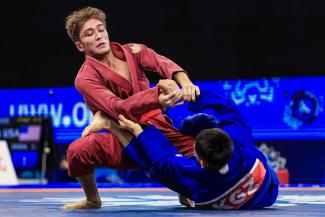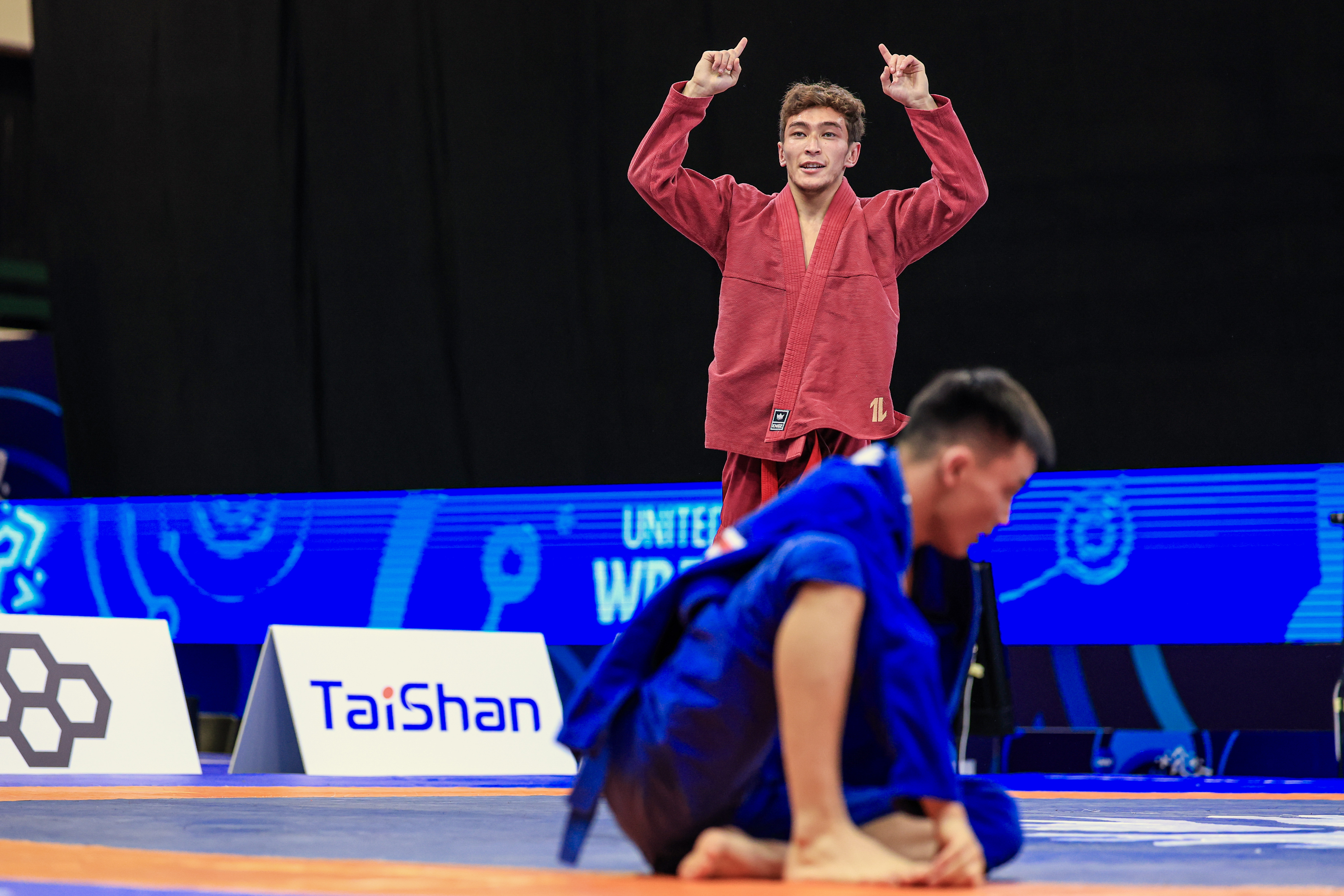Turkey, India share spoils on Zouhaier Sghaier Day 1
Thursday, July 14, 2022 - 19:53 By Vinay Siwach

TUNIS, Tunisia (July 14) -- Junior world champion Muhammet BAKIR (TUR) put on a clinical display to lead Turkey's charge on day one of the Zouhaier Sghaier Ranking Series event, the fourth and final of the year.
On the first day, six Greco-Roman gold medals were on offer and Turkey and India snagged three each with close to perfect performances at the Sports Hall of Rades.
Bakir's performance highlighted Turkey's depth at the superheavyweight in Greco-Roman with Riza KAYAALP (TUR) and Osman YILDRIM (TUR) already there.
He wrestled two bouts in the day and won both without much trouble. In the morning, he was up against NAVEEN (IND) and after being given the advantage of Naveen's passivity, Bakir got a roll from par terre to make the score 3-0, a lead which he kept till the clock expired.
In the evening session, he was up against Amine GUENNICHI (TUN) in a virtual gold medal match. Guennichi had also defeated Naveen 5-3 in their bout.
Bakir was once again the aggressive wrestler of the two and was given a point for Guennichi's passivity. Despite his strong defense, Guennichi gave up two turns to Bakir who was up 5-0.
The positions were reversed in the second period but Bakir was stronger in defense and did not give up any turns. Ultimately, he won the bout and gold 5-1.

The second gold for Turkey came at 97kg as Muhutdin SARICICEK (TUR managed to win all three of his bouts. While he defeated Mohamed JABRI (TUN), 12-0, in the Round 3 bout, it was the morning bout against DEEPANSHU (IND) that all but confirmed his gold.
Saricicek and Deepanshu were involved in a tense battle and the Turkey wrestler managed to pull off a 2-1 win in the end.
Deepanshu rallied back to beat Adem BOUDJEMLINE (ALG), 1-1, in Round 3 in the evening to confirm a silver medal for himself in the Nordic bracket.
Veteran Ayhan KARAKUS (TUR) gave Turkey its third gold when he began the evening session with a 9-0 technical superiority win over Arjun HALAKURKI (IND).
Using the arm-trap after par terre, Karakus finished the bout in just 1:58 to claim the gold at 60kg.

At 67kg, Asian Championships bronze medalist NEERAJ (IND) was coming into Round 3 against Volkan CAKIL (TUR) unbeaten. A win against the Turkey wrestler would secure the gold medal for him.
But Cakil surprised Neeraj with a big four early in the bout. Neeraj cut the lead to 4-3 with a takedown which Cakil challenged but lost. The second period also began with a four-pointer from Cakil which made his lead 8-3.
As time progressed, Neeraj continued his attacks against a tiring Cakil and got a stepout, stepout and caution and a takedown to mount a comeback. But Cakil had got another two points when he used Neeraj's momentum for an arm throw in the second period.
A tiring Cakil managed to hang on for an 11-8 win but that did not get him the gold which went to Sachin SAHRAWAT (IND).
Neeraj had defeated Sahrawat in the morning session while Sahrawat had won against Cakil 8-0. With three wrestlers tied with two wins each, the classification points came into play.
Sahrawat collected a total of nine points after his 10-1 win over Koussay MELKI (TUN). Neeraj finished with eight classification points while Cakil had seven.
The two other gold medals for India came with much clearer results.
Former Asian champion Sunil KUMAR (IND) struggled against Mohamed MISSAOUI (TUN) but managed to win 2-1 in the only bout at the 87kg weight class.
The two exchanged passivity points but Kumar had a stepout point which proved to be crucial in the end. Mussaoui got the third passivity as well but he failed to turn Kumar from par terre.
At 60kg, Gyanender DAHIYA (IND) dominated Oussama NASR (TUN) for a 9-0 in the lone bout at the weight class.
After getting the par terre advantage, Dahiya scored via gut wrench and finished the bout with 4:06 still remaining on the clock.
Friday, the second day, will witness the remaining three Greco-Roman weight classes and four women's weights will be in action in Tunis.
Day 1 Results
60kg
GOLD: Ayhan KARAKUS (TUR) df. Arjun HALAKURKI (IND), 9-0
BRONZE: Abdelkarim FERGAT (ALG) df. Salim HAMDI (TUN), 10-4
63kg
GOLD: Gyanender DAHIYA (IND) df. Oussama NASR (TUN), 9-0
67kg
Round 3: Volkan CAKIL (TUR) df. NEERAJ (IND), 11-8
Round 3: Sachin SAHRAWAT (IND) df. Koussay MELKI (TUN), 10-1
Final standings
GOLD: Sachin SAHRAWAT (IND)
SILVER: NEERAJ (IND)
BRONZE: Volkan CAKIL (TUR)
87kg
GOLD: Sunil KUMAR (IND) df. Mohamed MISSAOUI (TUN), 2-1
97kg
Round 3: Muhutdin SARICICEK (TUR) df. Mohamed JABRI (TUN), 12-0
Round 3: DEEPANSHU (IND) df. Adem BOUDJEMLINE (ALG), 1-1
Finals standings
GOLD: Muhutdin SARICICEK (TUR)
SILVER: DEEPANSHU (IND)
BRONZE: Adem BOUDJEMLINE (ALG)
130kg
Round 3: Muhammet BAKIR (TUR) df Amine GUENNICHI (TUN), 5-1
Final standings
GOLD: Muhammet BAKIR (TUR)
SILVER: Amine GUENNICHI (TUN)
BRONZE: NAVEEN (IND)


 Alikhan ALSHINBAY (KAZ) celebrates after winning the 58kg final in Grappling Gi. (Photo: United World Wrestling / Amirreza Aliasgari)
Alikhan ALSHINBAY (KAZ) celebrates after winning the 58kg final in Grappling Gi. (Photo: United World Wrestling / Amirreza Aliasgari)
Share your thoughts.
Comments